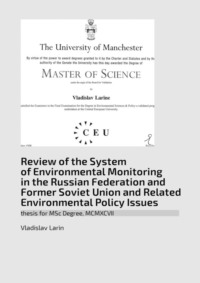Review of the System of Environmental Monitoring in the Russian Federation and Former Soviet Union and Related Environmental Policy Issues. Thesis for MSc Degree, MCMXCVII

Добавить В библиотекуАвторизуйтесь, чтобы добавить
Добавить отзывДобавить цитату
Review of the System of Environmental Monitoring in the Russian Federation and Former Soviet Union and Related Environmental Policy Issues. Thesis for MSc Degree, MCMXCVII
Вы ознакомились с фрагментом книги.
Для бесплатного чтения открыта только часть текста.
Приобретайте полный текст книги у нашего партнера:
Всего 10 форматов
Авторизация